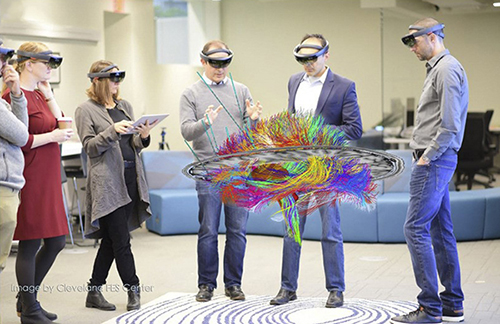Archived Content
The National Institute of Mental Health archives materials that are over 4 years old and no longer being updated. The content on this page is provided for historical reference purposes only and may not reflect current knowledge or information.
Personalizing Deep Brain Stimulation for Treatment-Resistant Depression
• Research Highlight
Treatment-resistant depression (TRD) is diagnosed after an individual has tried several types of treatment for depression and their symptoms haven’t improved. The effectiveness of deep brain stimulation (DBS) as a treatment for disorders such as Parkinson’s disease has led researchers to investigate whether it could also work for psychiatric disorders such as TRD. However, depression varies significantly among individuals, and studies on DBS for TRD have also produced variable results. This points to a need to personalize DBS treatment for individuals with depression.
In a recent study supported in part by the National Institutes of Health, a research team led by Sameer Sheth, M.D., Ph.D. , and Wayne Goodman, M.D. , at Baylor College of Medicine, and Nader Pouratian, M.D., Ph.D. , at the University of Texas Southwestern Medical Center, investigated whether they could personalize DBS for an individual with depression by gaining an understanding of how that person’s brain networks regulate mood and respond to stimulation. The researchers adapted a technique known as intracranial electroencephalography (EEG)—often used to understand brain networks in people with epilepsy—to analyze the brain networks of an individual with TRD.
The first participant to complete their study was a male individual with a history of severe TRD. For this patient, the researchers used stereo-EEG, a method of placing recording electrodes within the brain, to analyze brain network activity. At the same time, they implanted DBS leads in certain regions of the brain thought to be relevant to TRD. The researchers used a holographic augmented reality platform to plan the placement of the DBS leads.

Credit: Image appears courtesy of Elsevier, Copyright Elsevier (2021).
After implanting the leads and electrodes, the researchers performed continuous, high-resolution recordings for nine days while the patient carried out specific behavioral tasks, engaged in unstructured behavior, and received stimulation. The resulting data enabled the researchers to generate personalized stimulation parameters for the patient, an alternative to the trial-and-error approach that scientists often use to determine stimulation parameters.
In the outpatient portion of the trial, the researchers performed personalized DBS with the patient for eight months using the stimulation parameters they had determined. During this time, the patient reported steady improvements in mood, increased interest in pleasurable activities, and closer emotional connections to loved ones. Professionally, the patient noticed improved concentration and performance, and his partner reported that the patient was more talkative, emotionally engaged, and interested in shared activities. Overall, DBS led to remission of symptoms and a dramatic improvement in quality of life.
The researchers then started a blinded portion of the trial, in which they reduced stimulation at times unknown to the patient. This helped the researchers determine whether the patient’s response was truly due to DBS or a placebo effect. They found that the patient’s symptoms worsened during the blinded withdrawal phase and then improved once stimulation was reinstated, confirming that the improvements were due to DBS.
The researchers say that these findings demonstrate the initial feasibility of this novel platform for personalized DBS. While more research is needed before this platform is ready for use, the researchers suggest that this approach, if consistently shown to be safe and effective, could be used to develop and improve surgical neuromodulation for many neurological and psychiatric disorders.
The study was supported in part by the NIH Brain Research Through Advancing Innovative Neurotechnologies® (BRAIN) Initiative .
Reference:
Sheth, S. A., Bijanki, K. R., Metzger, B., Allawala, A., Pirtle, V., Adkinson, J. A., Myers, J., Mathura, R. K., Oswalt, D., Tsolaki, E., Xiao, J., Noecker, A., Strutt, A. M., Cohn, J. F., McIntyre, C. C., Mathew, S. J., Borton, D., Goodman, W., & Pouratian, N. (2021). Deep brain stimulation for depression informed by intracranial readings. Biological Psychiatry. DOI: 10.1016/j.biopsych.2021.11.007
Grant:
MH106700 , MH114854 , MH116364 , NS103549 , NS100549 , NS104953 , NS105690
